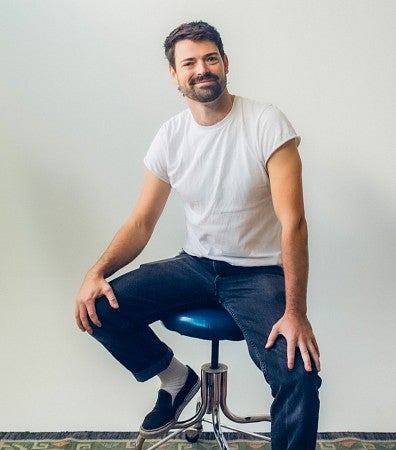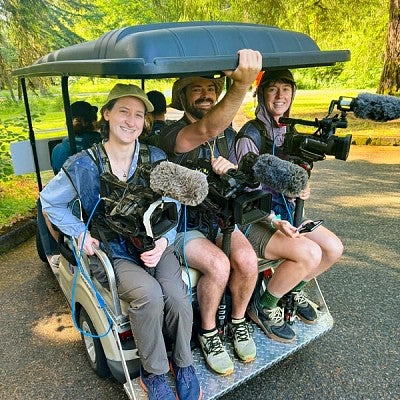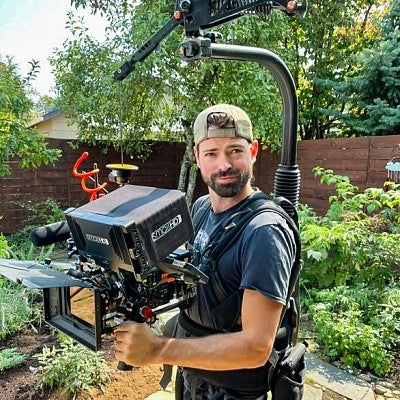Kyle LaMontagne ’25 refined his documentary storytelling skills in the SOJC’s Multimedia Storytelling Master’s program.
By Connor Baird, class of ’26
As part of a series highlighting graduating students from the SOJC, advertising major Connor Baird interviewed Multimedia Storytelling Master’s (formerly the Multimedia Journalism Master’s program) graduate student Kyle LaMontagne about his journey as a documentary filmmaker.

1. What made you choose the UO School of Journalism and Communication (SOJC) for your graduate studies — and what stood out about the program once you got here?
I went into grad school with the mindset that I wanted to become the most skilled and successful documentary filmmaker I could possibly become while staying in the Pacific Northwest. There really aren’t too many options in the PNW for documentary, and even this program isn’t specifically documentary, but it focuses on many of the skills I wanted to learn. Also, it’s all about network and community in the field of documentary, so it’s great to grow a network of talented, ambitious media makers in the good old PNW.
2. What’s your favorite project that you’ve worked on at the SOJC?
I’m working on a terminal project on the Mexican-American border. It has been so challenging and eye-opening and has been such a great opportunity to grow as a filmmaker. I chose a topic that I thought was exciting, emotional, politically complex, in the zeitgeist and focused on better understanding our shared humanity. And, of course, it has to have great characters — good storytelling starts with expressive, passionate characters with a clear mission. Oh, and conflict and beautiful scenery are a must. … So a few factors went into deciding on the topic.

3. Was there a professor or mentor who made a lasting impact on you?
A big reason I decided to join this program was because of a professor named Mitchell Block. He was an incredibly hard-working, accomplished and a generous mentor to me for my first year in the program. We had a strong bond and would communicate at least once a week, as he gave me guidance and advice on how to become a master of the documentary craft. As many readers probably know, Mitchell sadly passed away last year. It was really tough and caught me completely by surprise, but I am just glad to have absorbed as much of his wisdom as I did while he was still with us.
4. How did the SOJC give you space to experiment, learn and develop your craft?
There are many opportunities in this program to make projects, take chances and explore your craft in any way you want, really. I took every opportunity I could to turn each class into a short film. That's how I learn best: taking chances, trying new things in a low-risk environment with the guidance of professors and peers.
In our program, many classes require that we make a video project for the final. I used each of those final assignments to go above and beyond and try to make a short film worthy of getting into festivals. I made a four-minute short called “The Wild History of Willamette Falls” in an explanatory journalism class that’s been shown in a few festivals and even won Best Student Short at the Seattle Indie Film Fest.

I also made a seven-minute short called “Mother of Portland” that was accepted to the Sedona Film Festival as well as a few others. The terminal project I'm working on, “The Great Divide,” is my most ambitious yet — it’s turning into a feature film. There are a few more examples, but the point is, I don't really focus on the grade when making a project. I focus more on making something that could potentially get sold, picked up or noticed at a festival. And I guess I tend to bite off a little more than I can chew each time. That way, I stretch my skill set.
5. What advice would you give someone considering journalism or documentary work at the SOJC?
Use the abundant resources of the mighty UO. The degree part doesn't matter that much; it’s the skills and connections you need to focus on. The resources are mainly the skilled professors and professionals, your colleagues in the cohort, the gear and access to grants and whatnot. My network of fellow student filmmakers has been a great resource. That’s probably the No. 1 benefit of this program — building a network of passionate, skilled teachers and students to collaborate with.
Connor Baird is a third-year advertising major at the SOJC with a minor in writing, public speaking and critical reasoning. He is a writing intern for the SOJC and the co-director of After Hours, an advertising portfolio club.
